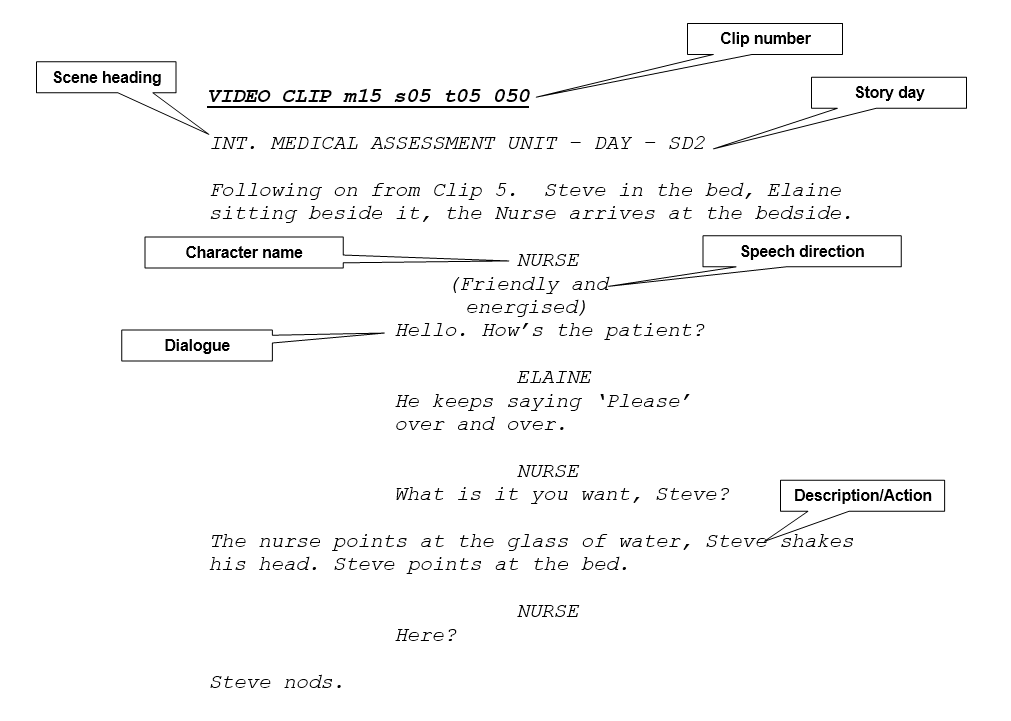What the 7 types of scripts? When it comes to writing a script, one of the most important decisions you can make is deciding what type of script best suits your project.
Whether you’re a beginner just starting out in the world of screenwriting or a seasoned pro looking for new ways to tell stories, understanding the seven types of scripts can help ensure that you create something unique and captivating.
From episodic television to feature films, documentaries, and even web series, each type has its own specificities when it comes to structure and style that can have an impact on how the story turns out.
So if you’re ready to explore the different options available for scripting, let’s find out what are the 7 types of scripts.
What Media Require a Script?

Television and film are two media that require a script in order to provide dialogue and actions for actors and to guide the overall structure and pacing of the story. A television or film script is typically written in a specific format and includes descriptions of characters, locations, and actions, as well as the dialogue for the characters.
Theater is another type of media that requires a script in order to provide dialogue and stage directions for the actors and to guide the overall production. A theater script is usually written in a specific format and includes descriptions of characters, locations, and actions, as well as the dialogue for the characters and stage directions for the actors.
Video games also use scripts to provide dialogue and actions for characters and to direct the overall gameplay experience. A video game script is typically written in a specific format and includes descriptions of characters, locations, and actions, as well as the dialogue for the characters and instructions for how the gameplay will unfold.
Other types of media that may use scripts include radio, podcasts, and audiobooks. In these cases, the script provides dialogue and actions for the performers and directs the overall structure and pacing of the production. A script for one of these media may be written in a specific format and include descriptions of characters, locations, and actions, as well as the dialogue for the characters.
How Scripts Are Used In Media

Scripts are an essential component of media production, as they provide a detailed outline of the pacing, dialogue, and action for a project. This allows filmmakers and other media professionals to plan out their projects in a structured and organized way, ensuring that the final product will be coherent and compelling.
Scripts can also be used to secure funding for a project. Many investors and studios require a detailed script before they will commit to providing financial support. By presenting a well-written and thoughtfully planned script, media professionals can demonstrate their vision for the project and convince potential backers of its potential for success.
In addition to helping with pre-production, scripts can also be used to streamline the production process itself. By providing a clear roadmap for all members of the team to follow, scripts can help ensure that the project stays on track and is completed efficiently. This is especially important for larger projects, which may involve many different departments and a large number of people working together.
Finally, scripts can be useful during post-production, as they provide a reference for editing and sound design. By having a written record of the intended pacing and dialogue, editors and sound designers can ensure that they are creating a final product that is true to the original vision. This can help to ensure that the project is cohesive and well-balanced, with all elements working together to create a compelling final product.
Benefits Of Using Scripts In Media
One of the major benefits of using scripts in media is that they provide a clear structure and roadmap for a project. This can help to ensure that the final product is coherent and easy for audiences to follow. By outlining the pacing, dialogue, and action in advance, scripts can help filmmakers and other media professionals plan out their projects in a more organized and effective way.
Scripts can also be used to secure funding for a project. Many investors and studios require a detailed script before they will commit to providing financial support. By presenting a well-written and thoughtfully planned script, media professionals can demonstrate their vision for the project and convince potential backers of its potential for success.
In addition to helping with pre-production, scripts can also be used to streamline the production process itself. By providing a clear guide for all members of the team to follow, scripts can help ensure that the project stays on track and is completed efficiently. This is especially important for larger projects, which may involve many different departments and a large number of people working together.
Another benefit of using scripts in media is that they can help with post-production. By having a written record of the intended pacing and dialogue, editors and sound designers can ensure that they are creating a final product that is true to the original vision. This can help to ensure that the project is cohesive and well-balanced, with all elements working together to create a compelling final product. Overall, scripts are an important tool that can help media professionals create high-quality, effective projects.
7 Types Of Scripts
- Screenplays are scripts used in the film and television industry. They are typically written in a specific format and include descriptions of characters, locations, and actions, as well as the dialogue for the characters. A screenplay is intended to be a blueprint for the final product, providing a clear and detailed roadmap for the director, actors, and other members of the production team to follow.
- Stage plays are scripts used in the theater industry. Like screenplays, they are written in a specific format and include descriptions of characters, locations, and actions, as well as the dialogue for the characters and stage directions for the actors. A stage play script is intended to provide a detailed guide for the director, actors, and other members of the production team to follow in order to create a successful stage production.
- Video game scripts are used to provide dialogue and actions for characters and to guide the overall gameplay experience in video games. They are typically written in a specific format and include descriptions of characters, locations, and actions, as well as the dialogue for the characters and instructions for how the gameplay will unfold.
- Radio scripts are used in the radio industry to provide dialogue and actions for performers and to guide the overall structure and pacing of a radio production. They may be written in a specific format and include descriptions of characters, locations, and actions, as well as the dialogue for the characters.
- Podcast scripts are used in the podcasting industry to provide dialogue and actions for performers and to guide the overall structure and pacing of a podcast. They may be written in a specific format and include descriptions of characters, locations, and actions, as well as the dialogue for the characters.
- Audiobook scripts are used in the audiobook industry to provide dialogue and actions for performers and to guide the overall structure and pacing of an audiobook. They may be written in a specific format and include descriptions of characters, locations, and actions, as well as the dialogue for the characters.
- Advertising scripts are used in the advertising industry to provide dialogue and actions for performers and to guide the overall structure and pacing of an advertisement. They may be written in a specific format and include descriptions of characters, locations, and actions, as well as the dialogue for the characters. Advertising scripts may be used for a variety of media, including television, radio, and online advertisements.
Conclusion
By and large, scripting is a critical aspect for all media. Whether it’s TV, radio, film, theatre, or video games, the same basic script elements remain such as protagonist, antagonist, setting, plot points.
Each one of these components play a role in holding together the narrative presented. Without them, media production becomes an unstructured collection of ideas without context; they need the script to breathe life into the project.
Polishing up scripts before production helps ensure the story remains cohesive and follows an appropriate structure that allows audiences to follow along with comfort and clarity.
Furthermore, there are subtle improvements and adjustments that can be made by adapting one particular type of script to another.
Ultimately then, understanding how these seven different types of scripts work can provide insight on how professionals bring these stories to life in production.
Related:
- How To Rewrite A Script Like A Pro
- What Is One Of The Characteristics Of A Strong Theme?
- 10 Of The Greatest Horror Movie Scripts
- How Much Does It Cost To Hire A Screenwriter?
- How To Teach Screenwriting
- The Best Screenwriting Internships
- How To Make A Screenwriting Portfolio
- How To Get Noticed As A Screenwriter
- How To Get Better At Screenwriting
- How To Break Into Screenwriting
- How To Write A POV Shot In A Screenplay


Leave a Reply